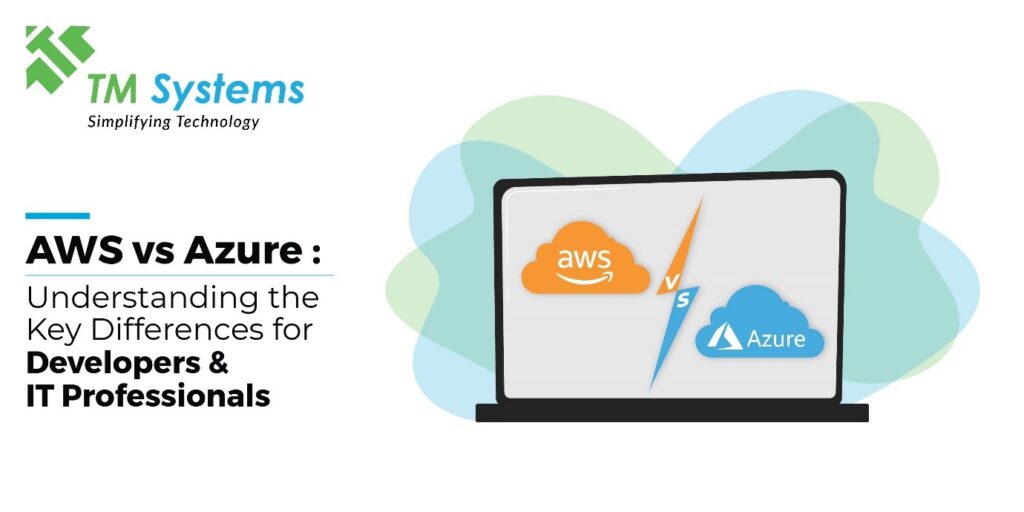
AWS and Azure: Understanding the Key Differences for Developers & IT Professionals

AWS and Azure: Understanding the Key Differences for Developers & IT Professionals
To know the future of cloud services, you first need to understand the differences between AWS and Azure. Both cloud providers provide powerful and robust infrastructures to help organizations manage
and scale their IT environments. However, they serve different needs and have different business models.
So if you’re looking for software solutions that can adapt easily to both environments, this post will help you decide which cloud service provider is the perfect choice for your business.
AWS and Azure are two of the most popular cloud services in the world. Both have advantages, but they also have some key differences that may affect your choice. This article will explain those differences and how they can impact your business.
1. Simplicity of Use
Both AWS and AZURE are user-friendly, but they also come with a lot of complexities and complications. AWS becomes simpler once you get used to it. The platform gives a lot of flexibility and freedom to the user when it comes to customization and the integration of third-party extensions, so developers and IT professionals will appreciate working with it.
On the contrary, AZURE is easier, especially for those experienced with using the Windows platform. It is less difficult to create hybrid environments, integrate additional servers, and run cloud instances. Users who are familiar with working with technologies like Active Directory and the SQL database will prefer using AZURE.
2. Flexibility
Amazon Web Services and the Azure Cloud platform offer various services that can be used independently or combined to meet your business needs. For example, if you’re a small business looking for a solution that will allow you to scale as you grow, then AWS may be the most suitable solution for you because it offers a host of different cloud services like EC2 (Elastic Compute Cloud) and S3 (Simple Storage Service).
On the other hand, if your company requires more advanced features like automatic scaling and elasticity, then the Azure cloud platform may be the best solution for you because it has many more advanced features such as storage options such as RDS (Relational Database Service), SQL Database, LocalDB, and so on. With these two platforms, there’s no need to choose between one solution over another!
3. Licensing
Customers are not required to deal with license issues while using Azure or AWS. Customers only need to pay for the services they use because both have a pay-as-you-go pricing structure and if they’ve already paid for the service, they’re eligible for license mobility in Microsoft Azure.
Although Azure is simpler for Windows administrators to set up, AWS is more flexible and feature-rich. AWS offers software as a service (SaaS), making it more flexible and generating more revenue than Azure.
4. Security
The security offered by AWS and Azure is very similar (both companies have excellent security features). AWS is doing a great job of choosing secure options and settings by default, ensuring increased privacy. Azure employs Microsoft’s Cloud Defender service for security and data privacy, an AI-powered solution that guards against new and existing threats. By analyzing this, AWS is demonstrably more dependable and secure than Azure’s AI service.
5. Pricing Models
As previously mentioned, AWS and Azure both have pay-as-you-go pricing models and offer affordable pricing schemes for all businesses. Azure is charged per minute, whereas AWS is charged on an hourly basis. AWS pricing is based on use, while Azure pricing has a fixed monthly cost. Therefore, if you often use cloud services, AWS may be a slightly more expensive alternative.
6. Networking
A Virtual Private Cloud (VPC) from Amazon allows users to build private networks inside the cloud, while Azure uses the Virtual Network (VNET) feature. Both of the features allow customers to build isolated networks, subnets, route tables, private IP address ranges, and network gateways.
7. Storage Space
AWS and Azure both provide adequate cloud storage. AWS provides services such as Amazon Basic storage service (S3), elastic block store (EBS), and Glacier, whilst Azure Storage Services provides blob storage, disc storage, and the standard archive but it also gives temporary storage via the D drive and block storage capabilities.
8. Developer Tools
AWS and Azure both offer a wide range of developer tools that can be used to build and run your applications.
AWS offers several tools for creating applications, including the AWS CloudFormation template language and the AWS SDKs for Java, Python, JavaScript, PHP, and Ruby. These tools allow you to create highly customizable infrastructure using declarative templates that specify where resources are located and how they should be configured.
Azure also provides various developer tools that help developers build their applications quickly without writing code themselves. These include Visual Studio Code (VSCode), which allows you to edit code directly within VSCode without downloading additional files or installing additional software on your computer.
Conclusion
When considering which cloud service to use, developers and IT professionals should look beyond price and feature comparisons. They should also analyze the systems, software, and tools’ end-to-end experience, performance, and scalability. With so many services at each company, it’s difficult to benchmark each in a meaningful way across all categories. Instead, we recommend using guides like this one as a starting point for making your decision but remember that the real proof is in how you plan to use AWS or Azure over the long term.




